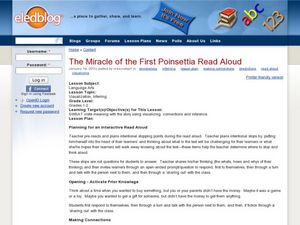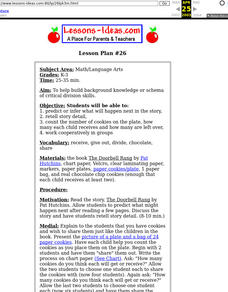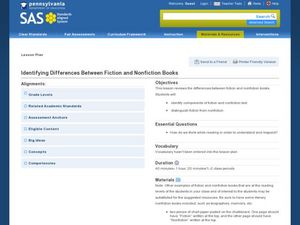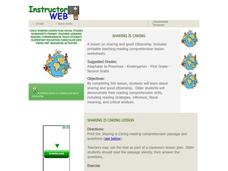August House
The Great Smelly, Slobbery, Small-Tooth Dog
Read the story The Great Smelly, Slobbery, Small-Tooth Dog: A Folktale from Great Britain by Margaret Read MacDonald and choose from multiple activities to learn about the tale's theme—kindness. With so many options, your kind kids will...
Curated OER
Two Greedy Bears
Improving listening comprehension skills is the goal of this language arts lesson. Young readers listen to the story Two Greedy Bears, stopping to have discussions with a partner. They predict outcomes and make inferences based on...
Curated OER
The Miracle of the First Poinsettia
Connecting to literature and learning how to infer are two great reading strategies everyone needs to know. Here, the class will read along with the story The Miracle of the First Poinsettia, review folktales as a genre, and make...
Curated OER
Tomas and the Library Lady
Students practice read aloud comprehension strategies. In this literacy comprehension lesson plan, students listen to Tomas and the Library Lady, stopping to discuss with a partner aspects of the story suggested by the teacher. Students...
Pennsylvania Department of Education
Analyzing Key Ideas and Details in Nonfiction
Students explore nonfiction texts. In this language arts instructional activity, students read a nonfiction text and make predictions. Students identify facts and opinions in the text and draw conclusions as they read.
Curated OER
Making Inferences and Drawing Conclusions
Second graders make several inferences based on the reading of Shel Silverstein poems. They write their own poetry and complete an assessment in which they differentiate between sentences that are stated or inferred.
Curated OER
Circle of Gold Guided Reading
Students participate in a variety of Guided Reading activities including comprehension questions, discussion, prediction, characterization and inferring meaning while they read Circle of Gold by Candy Dawson Boyd.
Curated OER
Introducing Literary Elements in Fiction
Identify literary elements in fiction. In this reading comprehension lesson, learners read the book Pigsty and record literary elements onto a graphic organizer. They specifically discuss the main characters and events in the text.
Curated OER
Summarizing Key Information
Imagine the surprise when small groups present their Evidence Charts to the class and discover that each group has studied a different version of the Cinderella story. Irish, Ojibwa, Egyptian, Chinese, Korean, Persian, Mexican, and...
Curated OER
Lesson Plan #26
Students build background knowledge or schema of critical division skills by predicting or inferring what will happen next in the story, retelling story detail, and counting the number of cookies on the plate.
Curated OER
Biographies
Students read a biography and discuss what defines a biography. Students choose a biography of their own interest to read and write a report about one of the people in the biography. Reports are shared with classmates.
Pennsylvania Department of Education
Comparing Key Ideas and Details in Fiction and Nonfiction
Students recognize the differences between fiction and nonfiction texts. In this genre study instructional activity, students discuss what nonfiction means and write the definition. Students listen to a read aloud and vote whether the...
Curated OER
Identifying Differences Between Fiction and Nonfiction Books
Students explore the differences between fiction and non-fiction book. In this genre study lesson, students read examples of fiction and non-fiction and identify the characteristics of each genre. Students list the characteristics on a...
Curated OER
Leo and the Butterflies
Second graders read a book entitled, "Leo and the Butterflies." They discuss the rainforest and butterflies. Students observe the pictures and predict what will happen in the story. They examine reading strategies for decoding unfamiliar...
Curated OER
Let's Roll Robots!
Students write a story about robots. In this creative writing lesson, students read a story about robots, make their own robot, and write a story about their robot. In addition, the lesson plan suggests taking photos of the robots to add...
Curated OER
Making Predictions by Analyzing Key Ideas and Details
Pupils make predictions. In this language arts instructional activity, students read nonfiction texts and make predictions about what they are going to read. Pupils confirm and revise their predictions as they read the text.
Curated OER
Reviewing Literary Elements
Young scholars identify the elements of fiction, and work on compare and contrast skills.. In this comprehension lesson plan, students read different versions of Cinderella. Young scholars use a Venn diagram to compare and contrast the...
Pennsylvania Department of Education
Using Literary Elements to Compare Fiction Texts
Students explore language arts by reading and reflecting on literary examples. In this fiction writing lesson plan, students read several different cultural versions of the story "Cinderella" and discuss their interaction with the story...
Curated OER
Sharing is Caring
Students explore the concepts of sharing and good citizenship. They demonstrate reading comprehension skills including inference, literal meaning and critical analysis.
Curated OER
Weather Proverbs
Define and write proverbs! Learners define proverbs, use the Internet to find weather-related proverbs, and talk with their parents to learn other proverbs. There's a well-structured worksheet included here.





















